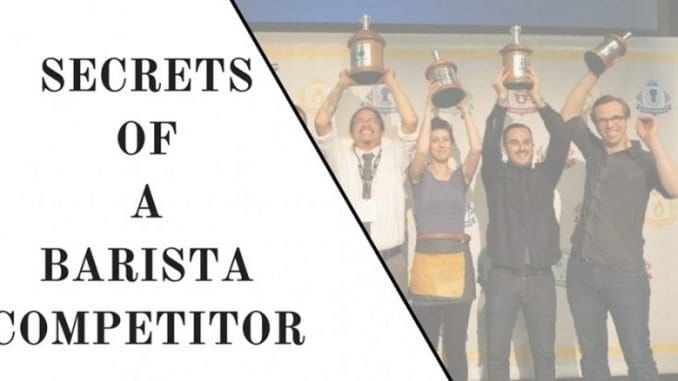
In this series, we’ll share the secrets of barista competitors. From choosing a theme to how to set a practice schedule, we’ll talk to seasoned competitors about how to compete smartly, efficiently, and effectively.
It seems like Murphy’s Law—anything that can go wrong will—is never more applicable than during a high-stress time like barista competition. Although we should hope for perfect routines, you should practice and prepare for situations where something could be dropped, broken, or just completely forgotten.
Michael Harwood’s 2015 USBC performance almost plays out as an ode to Murphy’s Law. Michael, a seasoned competitor (he’s competed over ten times!) and the Training and Quality Assurance manager for Ceremony Coffee in Annapolis, Maryland, performed his routine in all three rounds of competition. He eventually placed 6th in the nation by serving the judges three different espressos ground using a Mahlkonig EK43 grinder. However, Michael’s grinder not only seized during his practice time, but also during one of his performances. And yet, Michael stayed calm and preserved, earning a spot as a finalist with most observers none the wiser that there were any technical issues. Michael shares some of his tips for keeping it together and rolling with mistakes.
- Ask for help from your coworkers, product representatives, or other competitors.
Michael noticed no issues with his grinder until his one hour practice session started. “Hitting the green button on my well-traveled Mahlkonig EK43 grinder though, something doesn’t sound right. Broken-sounding, in fact,” he notes. Since you’re at a barista competition, there’s a high chance that there’s someone around who can give you a hand. “Miraculously, a team of caring people jumped in to help. From Mahlkonig reps Travis [Jones] and Kyle [Ramage], to my boss Vince [Iatesta] and co-worker Ronnie [Haas], the support I felt was staggering.” If you need something fixed, there’s probably a technician or a representative ready to help fix or replace something. If you forget something, another competitor is likely to lend you something.
- Always have a backup.
At almost every competition I’ve been to, someone has had to re-pull their shots. I’ve seen competitors drop drinks, re-do cappuccinos, or just flat out not like how their espresso pulled and re-did it. If this happens, it’s key to have extra cups or glassware on the ready. Not only does it help you get points (in the rules, competitors are encouraged to have extra glassware), but you don’t have to worry about cleaning or reusing a glass that spilled or has your bad espresso shot in it. There’s also a mental preparation that happens when you have a backup ready—you’re less likely to be frazzled when mistakes happen because you planned for it. You know you have the tools ready to roll with it, and you’re less likely to trip over yourself because of an unexpected spill.
Obviously, in Michael’s situation, you’re probably not going to have a backup grinder, but if you’re bringing your own grinder, try practicing with a different one in case you have to adapt during competition. “To recap, I had to dial-in three coffees in less than ten minutes on a grinder I’d never used, then immediately reset and perform for the panel of judges already waiting in the wings,” Michael shares of his grinder mishap. “Instead of feeling sorry for myself, I took a deep breath, embraced the chaos, and smiled at my proud colleagues and friends, who were standing just off-stage, cheering me on.” In that round, Michael ended up with the second-highest score and moved onto semi-finals.
- One mishap doesn’t erase months of preparation.
When Michael’s grinder failed during his practice time, he was unable to try any of his coffees before getting onstage to compete. “Though I could not dial-in or rehearse a run-through as planned, I used my time by running my lines with a friend and kept my mind calm by thinking that if people cared about me this much, no coffee-related issue could possibly upset me,” he shares. Just because something goes wrong doesn’t mean you didn’t spend all those months of practicing and preparing for nothing. Draw upon your strength—and the strength of others—to keep focused.
Michael tried his coffees for the first time during his prep time onstage, but he’d been working with his coffees for months. Although not ideal, he was still confident that he could explain and speak about his coffee to the judges. And while his grinder mishap was a huge bummer, it doesn’t matter to the people scoring you. So the best you can do is rely on your hard work and keep pushing through. “It’s a small thing, a grinder breaking; but no matter small issue or big, it’s how we carry on that really matters.”

